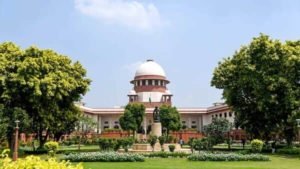The case originated from a complaint by Mr. E R Krishnamurthy, a Primary School Teacher, who required a certified copy of a Validity Certificate for Category-II A.
It was alleged that the Respondent demanded and accepted an illegal gratification of Rs. 1,500/- from the Complainant on 07.02.2007, for preparing a spot inspection report.
A trap was conducted by the Lokayuktha Police team, during which phenolphthalein-smeared currency notes amounting to Rs. 1,500/- were seized from the Respondent, and his fingers turned pink upon dipping in sodium carbonate solution.
The Trial Court convicted the Respondent under Sections 7, 13(1)(d) read with 13(2) of the Prevention of Corruption Act, 1988, sentencing him to simple imprisonment and a fine.
The High Court allowed the Respondent’s appeal, setting aside the conviction.
The current appeal before the Supreme Court was filed by the State through the Lokayuktha Police, challenging the High Court’s decision.
Law Involved The core legal provisions involved are:
Prevention of Corruption Act, 1988 (the ‘Act’):
Sections 7, 13(1)(d), read with 13(2), which deal with public servants taking gratification other than legal remuneration in respect of an official act, and criminal misconduct by a public servant.
Section 20: This section provides for a presumption that a public servant has accepted gratification as a motive or reward if a sum of money is proven to have been received. However, this presumption is rebuttable, and the onus is on the accused to prove their innocence.
The judgment also makes reference to the presumption under Section 118 of the Negotiable Instruments Act, 1881, as similar to Section 20 of the Prevention of Corruption Act, 198878.
Relevant case law was cited to interpret the application of Section 20, including State of Karnataka v Chandrasha (2024 SCC OnLine SC 3469), Md. Rahim Ali v State of Assam (2024 SCC OnLine SC 1695), Jay Kishan v State of U.P. (2025 SCC OnLine SC 296), and Paritala Sudhakar v State of Telangana (2025 SCC OnLine SC 1072).
Reasoning
Appellant’s contention: The recovery of tainted money established the bribe, activating the presumption under Section 20 of the Act, which the Respondent failed to rebut.
Respondent’s contention: The Complainant’s testimony was not credible and showed mala fide conduct. The alleged bribe was merely a repayment of money given to the Complainant at the time of the spot inspection. Furthermore, there was no work pending with the Respondent at the time of the alleged demand.
Court’s Analysis:
The Court noted the contradictory statements of PW2 (prosecution witness) regarding the alleged demand for bribe. PW2 initially stated he did not hear the conversation but later claimed the Respondent demanded money, and further contradicted himself by stating the money was not given at 12:30 PM but that the Respondent would return in the evening.
The Complainant’s own deposition lacked veracity and reliability. He categorically denied awareness of any spot inspection report by the accused on 05.02.2007, but then conceded it was signed by him and his father when confronted with Exhibit D8.
Crucially, the Court found no demand for a bribe proven. The physical/spot inspection on 05.02.2007 did not reveal any such demand.
The Court highlighted that the file had already been forwarded by the Respondent, implying there was no occasion for the Complainant to pay any amount, undermining the claim of a bribe demand.
Referencing established precedents, the Court reiterated that mere recovery of tainted money is not sufficient for conviction under the Act unless the demand and acceptance of gratification are proved. The presumption under Section 20 only arises after the demand is proven.
The Court found that the testimony of the Complainant and PW2 did not inspire confidence and was insufficient to prove the case beyond a reasonable doubt.
Ultimately, the Supreme Court agreed with the High Court’s assessment that the factum of demand was not proved beyond reasonable doubt.
Holding
The Supreme Court found no ground to interfere with the Impugned Judgment and Order of the High Court, which had set aside the conviction of the Respondent.
The appeal filed by the State of Lokayuktha Police stands dismissed.
State Of Lokayuktha Police V. C B Nagaraj
Supreme Court: 2025 INSC 736: (DoJ 19-05-2025)






